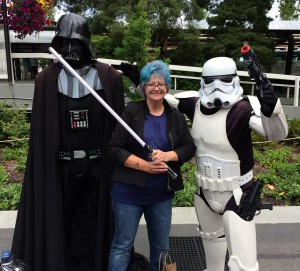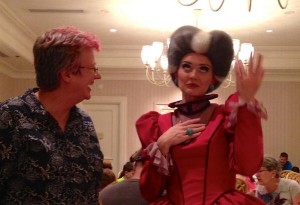
Dear SFWA members:
I think a proven track record’s a pretty good credential for the Presidential position, and so I propose you let me steer for another couple years, and after that, I’m going to take a year off volunteer work. Maybe do one of the cargoship cruises.
Here’s the stuff I’ve managed to do for SFWA over the past two and a half years. You could probably go back through the various Presidential letters in The Bulletin and get better detail but here are highlights.
- Worked with Operations Director Kate Baker to help her establish policies and procedures that advance the organization’s mission. Members will have noticed, for example, the implementation of the Singularity, the electronic newsletter that lets you know the latest and most important/interesting information from the organization. I feel strongly that establishing an operations director who really drives the organization overall, rather than relying on the random and sometimes wildly varying commitment levels of the President and Vice President is a good move, and I look forward to seeing the amazing stuff that Kate will do in coming years, based on the way she’s kicked ass so far.
- Due to the hard work of our fabulous financial team of Bud Sparhawk and Oz Drummond, I saw us through a financial crisis that could have taken down the organization and didn’t. The board and I worked to enable Oz and Bud to create a financial plan that will keep us going another 50 years. There’s been trimming, brainstorming, and general flensing of the budget, while additional sources of revenue have been developed and are starting to produce results. So far the biggest casualty of that crisis has been the NY reception. Another reason I’m running is that I promised the reception wouldn’t go away permanently and I’m still working on getting that back for us.
- Got Derek Kunskën running smoothly as our Volunteer Wrangler. We’ve gone from a situation where volunteer emails weren’t consistently getting acknowleged to one where they’re getting answers and finding spots in the organization where their volunteer efforts can make a real difference. In talking to Griefcom the other day, its head said that the Committee was fully staffed for the first time in his memory, and actually also had two people shadowing members in order to learn how to do it. Volunteers are also being recognized for their efforts; I hope to see some of you at the Volunteer recognition breakfast at the Nebulas .
- Recruited Maggie Hogarth as VP, so I will take indirect credit for the ton of great work she’s done but say that it is really all her effort that makes her such an outstanding team member. Indie writers, Maggie has been consistently looking out for your interests and making sure you are always represented in discussions. She’s driven community efforts, formed the Outreach Committee, worked with the Nebula Programming team to get representatives of companies like Amazon, Kobo, Patreon, etc there, set up the NetGalley program, and been an amazing ally.
- The Speakers Bureau is up and running, SFWA has been publicizing it via flyers at ALA and other academic conferences and it’s got almost 200 members listed there.
- The EMF process has been thoroughly looked at in order to make it easier for the members to use and is being revamped, including figuring out how to make a portion open to professional speculative fiction writers who are not members, which I expect to see happen within the next month. This hasn’t been entirely smooth, but the end result has been greater clarity and unity of purpose among our EMF stewards.
- Putting stuff in to provide for the future. This has been one of my biggest foci: looking at existing processes and groups and trying to make sure they’ll last. Most of the important volunteer roles now have understudies or shadows making sure that if the volunteer has to step down, someone is ready and prepared. We are writing things down. Conversations that used to be held in email are instead happening on the boards or in Evernote, where they are preserved. If I had to point to one issue that I thought was hampering SFWA when I came on board, it would be the lack of institutional memory and the way I kept hitting the sad carcasses of abandoned or lost projects that had gotten lost in the mists somewhere along the way. This is, in my opinion, no longer a problem. Huzzah!
- SFWA membership cards. I actually can take no credit for that, it was all Michael Capobianco and Kate, but I mailed out a bajillion, thanks to the friends who came and helped assemble them and Caren Gussoff, who did the actual mailing.

- SFWA’s “brand,” to employ vile marketing jargon, has grown, and what’s nice about that is that we’re continuing to acquire new members, many of whom immediately put energy in the discussion forums and volunteering.
- Institutional memory is being better preserved. The Operations Procedures and Practices Manual still needs to be delivered, so there’s still a ways to go, but our new Director-at-Large Erin Hartshorn recently took this on.
- Volunteer system as noted above.
- Indie writers are joining and contributing. For example, Jonathan Brazee is helping make sure that this year’s Nebula programming has plenty of panels of use to independently publishing peeps.
- Communication remains an ongoing goal, but is substantially better.
What to Expect From Two More Rambo Years

What am I hoping to get done that I haven’t already? This is a tough list because I regard the fact that a number of things aren’t farther along as a failure on my part, but here we go.
- Better integration of the game writers, because I think we’ve really fallen short so far and need to do better.
- Getting the finances to a point where the annual Reception can be brought back, although I’d like to see it alternating between East and West Coast.
- Movement on health care. We’ve got a task force exploring it. Our best bet may be teaming up with another organization, but this remains to be seen.
- Seeing The SFWA Bulletin on a regular schedule.
- Get the Preserve Your Legacy campaign, aimed at celebrating Bud Webster’s memory while giving writers the resources they need to set up their literary estate, launched.
- Continuing to put in processes. One of the things I’ve worked hard at is passing on what I know of corporate management, and trying to make sure we are consistently working at a professional level.
- Continuing to build relationships with other organizations, including other writers organizations as well as publishing and marketing partners.
- More and better outreach to potential new members.
- Continued advocacy for writers, like the recent statement about magazines trying to monetize writers.
Ponies for everyone.A pony in every pot.Pot for your pony.Scalzi will smoke pot with your pony.Membership cards, integrity, and whimsy.
This is an update of my statement of two years ago as to why I’m qualified.

I’ve worked as both a writer and an editor. I have over 200 fiction publications, including in such places as Asimov’s, Weird Tales, and Tor.com, and five collections (four solo, one with Jeff VanderMeer). I just turned in my second novel to the publisher (Wordfire Press) and am working on the third in the series. I’m a hybrid author, working in both traditional and independent publishing.
My short story, “Five Ways to Fall in Love on Planet Porcelain,” was a 2012 Nebula nominee, while other works have been nominated for the Locus Award and the Million Writers Award. I was the editor for several years of award-winning Fantasy Magazine, receiving a 2012 World Fantasy nomination for my efforts there, and I guest-edited Lightspeed Magazine’s Women Destroy Fantasy issue. I have worked as a volunteer with multiple speculative fiction organizations, including Broad Universe and the Clarion West Writers Workshop.
I teach a popular series of online classes on writing and editing and do some podcast narration, and have written a book on how writers can best use their online presence to sell books.
I am a frequent convention-goer and make a point of organizing or participating in SFWA activities when they’re available at such gatherings. This year, I will be attending ICFA, Emerald City ComicCon, Norwescon, the Nebula Award ceremony, the Locus Awards, Worldcon, DragonCon, and FenCon.
I’m running because it seems to me in these tumultuous times people need to be stepping up and leading. If I want other people to be volunteering time, I have to show it’s a task I’m willing to take on too. If I were grading my performance over the last year and a half, it’s a solid B. I’ve done some solid stuff, but I’ve also dropped a few balls. I’d like to get some more stuff finished up before the grade is in. And, selfishly, I love the team and would miss the hell out of that weekly videocall where we touch base.
Peace out,
Cat
#sfwapro







2 Responses